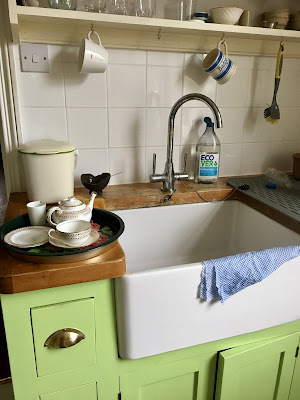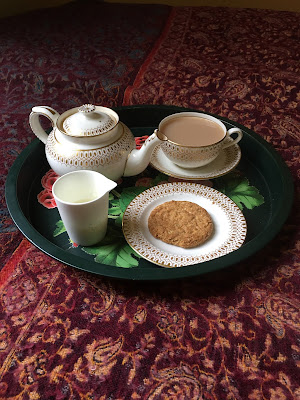When I was a little child, our family did not attend church, though my mother had an unshakeable faith in the unseen world — fairies mostly.
My father's father was a church organist, who knew the book of Psalms by heart, but was proud of his unbelief and used to leave the church to smoke his pipe during the sermon. I don't know what my father believed; he never spoke of it.
My family came from humble roots. My mother's family had worked their way up from poverty to substantial land-owning wealth by hard graft, thrift, and shrewd strategic decisions. Her father had paid for the fields he first rented then bought by working as a silver-service waiter on a cruise ship; so he moved through life close to affluence and watched its ways, which he then imposed on his family. When she left school, my mother trained as a nursery nurse (she would not say 'nanny') and moved from there into employment caring for the children of families who were either aristocratic or simply rich. She, like her father, watched and learned — determined to climb the social ladder and make her way in the world. She raised me and my sister strictly in accordance with all she had seen and absorbed, and shepherded us away from bad influences like poor children and Enid Blyton books. My sister rebelled and bought Enid Blyton at jumble sales. I couldn't tell the difference between poor children and rich ones — but she did her best with us. She wanted us to do well.
When I was eight, the chance came (I think my mother inherited some money) to move from the market town where we lived to a rich village characterised by social exclusivity. Some seriously upmarket people lived there. The village straggled around a road about a mile or two in length, and the end around the church had large imposing homes, some medieval, while the other end had council houses. At first we lived in the middle, but my mother had her eyes on the prize of the church end. Over time she achieved this, and by the time I was a teenager we lived in the medieval bishop's palace (but only the groom's cottage – ha!) built just behind the church.
When we made this move to the village, we immediately began to attend church. Over time my mother — who was charming, beautiful and delightful — became firm friends with several of the ladies there. My father became what they call a 'sidesman' (gave out hymn books to people coming in and cleared them away at the end). I don't think either of them really believed in the Christian faith, ever, but my mother absolutely perceived the social advantage of attending the village church. It was, if you see what I mean, culture you didn't have to pay for (we never had much money) and gave us access to established and socially admired families — our state school education lacked those entrées.
So it was that I started going to church and hearing the Bible read, and getting to know the humble pragmatism and beautiful language of Cranmer's Book of Common Prayer.
One day when I was about eleven, our parish priest (one Canon Leslie Dewar) said something that arrested my attention.
It was not the done thing to laugh in church, or clap, or do anything vulgar and populist. We had to conduct ourselves with hushed modesty and dignity — actually I remember once when we were out for a walk near the church on a summer's day, my mother wanted to pop in to speak to someone she knew would be there cleaning it, but my sister had to sit outside on the bench in the porch because her shirt had short sleeves. There were unwritten rules, and customs, and I suppose that was why we went really.
But sometimes the no laughing was awkward because it was polite to laugh if a clergyman made a joke, and on this occasion Canon Dewar did, in his sermon.
He began it by saying, "A schoolboy once said that 'faith is believing in something you know isn't true'."
This was clearly intended to be amusing, which stimulated the curious response the congregation had evolved for such awkward moments when you must laugh because it's a joke but mustn't because it's church. A sort of undertone susurration of mirth, enough to encourage the speaker but not offend against the solemnity of sanctity.
I can't remember anything else our rector said in his sermon (or at any other time), but that entered my soul like an arrow and lodged there — permanently; it's still there. "Faith is believing in something you know isn't true."
It is one of the most useful things I have ever heard in a sermon. It's the thing that I believe to be the root of the child abuse that has been so widespread in the church — the habit church affiliation teaches you of stifling judgement, observation, thought, deduction, insight, logic and experience, in favour of doctrine and adherence/submission to tradition and ecclesiastical authority. It is, in my view, morally and intellectually dangerous.
In every church I have ever been (lots), most of the people, most of the time, say things they don't believe as though they were true, and have been doing so such a long time that they can no longer spot the difference.
Churches are institutions, organisations, big groupings — it stands to reason that one person's real view on life will never be an exact profile match with the institution's creeds and tradition: so the church requires the suffocation of what a person really thinks in favour of what the church teaches. If you want to belong, you have to conform. During the years I was a Methodist minister, the Faith and Order Committee moved from requiring that ordained people not teach anything contrary to Methodist doctrine to requiring that they not think anything contrary to it. If your family home and income depend on what you think and teach, it does concentrate the mind in the required direction.
In general in church circles, though, what you actually believe is not of great importance. So my grandfather who didn't believe a thing, my father who (I think) was a sceptic, and my mother whose only certainty was fairies, were all included and accepted because they wanted to belong. My grandfather wanted the stipend to augment the money he made as a greengrocer, and my mother wanted to climb the social tree, and my father went along with it. And they never said what they actually thought or believed, indeed it was not socially comme-il-faut to discuss religion; a hangover, perhaps, from the days when dissension meant certain death.
Recently, I have been exploring into the Orthodox Church. There is so much I love about it. I love the Catholic Church too (I was a Catholic for a decade of my life). I have thought wistfully about going back to Catholicism, but my inner watcher murmurs, "Yeah, but what about when Pope Francis dies? Anything could happen." So I've been reading and watching and listening about Orthodoxy.
I was suppressing in myself (faith means believing in things you know aren't true, remember?) how the Russian Orthodox Church turns a blind eye to gay-bashing, and the Orthodox Church rolls out the old tired rationales for excluding women from priesthood and refuses gay marriage; and I am very sorry that I permitted that voice inside me to be silenced. I suppressed in myself the reservations I felt about kissing the priest's ring and the warnings to the laity never to criticise bishops, and the veneration of relics; I thought I could get over that — because I wanted to. I set aside the instinct in me against clutter and paraphernalia and religion-by-stuff. I mean, I like icons and a bit of ecclesiastical bling and the actual monastics and hermits and priests seem to be humble and gentle and kind and good. I suppressed my misgivings about the Orthodox habit of constantly declaring one's own uselessness and sinfulness and inadequacy and unimportance — I understand the good motive it arises from, but it has a shadow side, I think, too.
I was drawn, most of all, by the utter luminosity I have seen in a friend who is progressing through to ordination — the authentic peaceful joy, that I recognise as indwelling Holy Spirit. That, I trust.
But then this morning I asked Google about the Orthodox Church stance on astrology; because this is always revealing. A friend of mine, a gay priest in London, once said to me, "Homosexuality is a touchstone," and the same is true of astrology.
Astrology and homosexuality are reliable ideological touchstones. I read article after article explaining why astrology is sinful and wrong from the Orthodox Church point of view. I respect their view as a view, what they had to say about astrology was based and argued on presuppositions I know for a fact are incorrect. What I read was arrogant, and mistaken.
And my eleven-year-old self, sitting in the sunlight filtering through stained glass set into stone-mullioned windows in an old flint church, looking up at a wooden pulpit, remembered those words: "Faith is believing in what you know isn't true." My inner snail drew silently back into its shell.
The Orthodox Church — beautiful, holy, shimmering, admirable, and showing forth so much from which I can learn; but, as a tribe, a sanctuary to which I could entrust my heart, not for me. "This also is Thou; neither is this Thou." Lord Jesus, lead me on. Help me find my tribe.

















